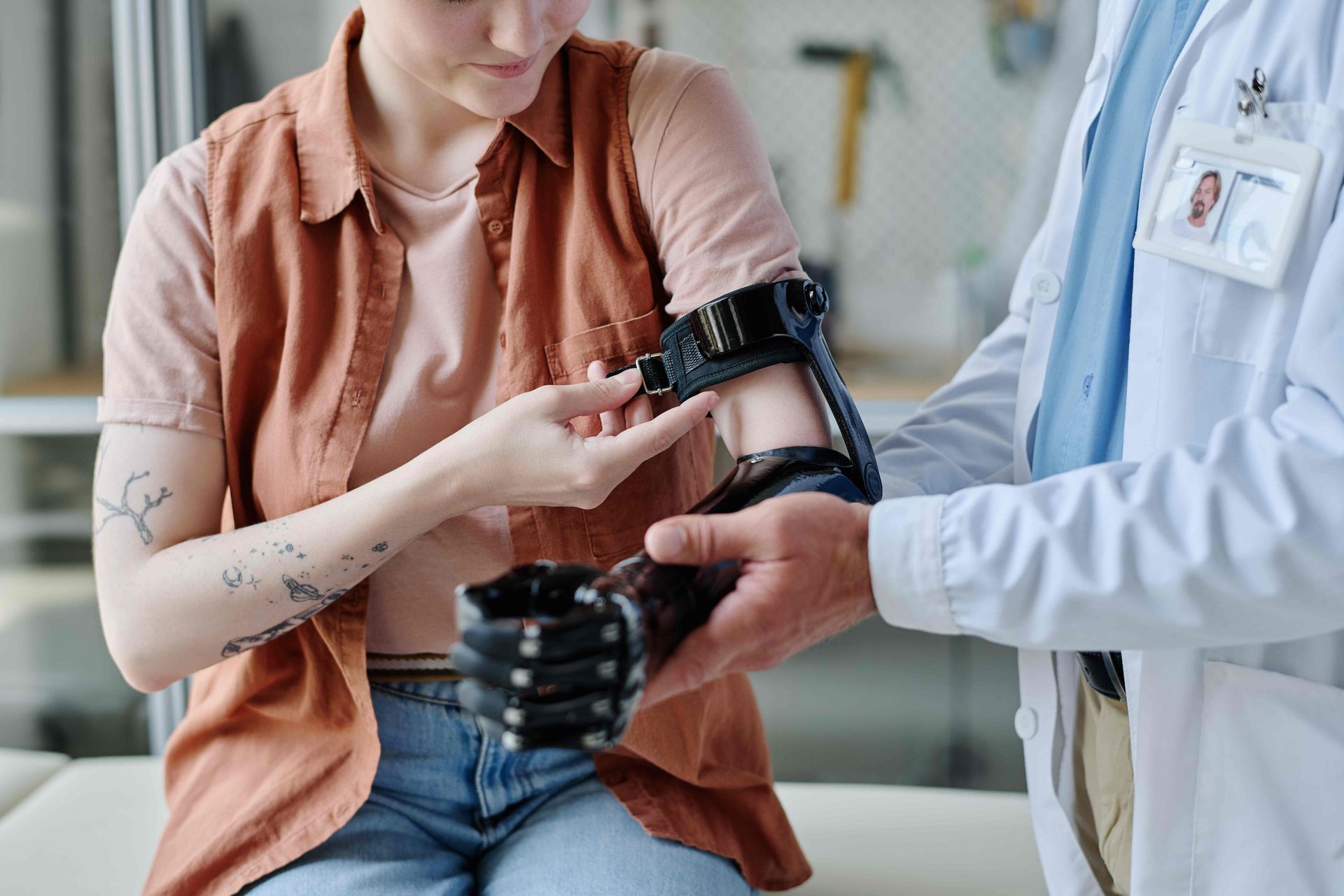Being fitted for and receiving a prosthetic arm isn’t a one-appointment process; at Durrett's Orthotics & Prosthetics, our team compares it to the initial phase of a rehabilitation journey. And by explaining the process beforehand, we’ll ease your concerns and set realistic expectations.

Initial Consultation for Prosthetic Arms
This journey begins with a comprehensive evaluation by a prosthetist. We’ll assess your amputation site, lifestyle needs, and daily activities during this appointment. Next, we will examine your residual limb's shape, muscle strength, and range of motion to determine suitable prosthetic options.
The prosthetist will ask about your goals—whether you need the device primarily for work tasks, hobbies, or basic self-care functions. That way, your prosthetic arm will meet your specific requirements and expectations.
Types of Prosthetic Arms
Different arm prosthetic styles offer various functions and control mechanisms.
- Body-powered prosthetics operate through harness systems and body movements for reliable function and tactile feedback.
- Myoelectric prosthetics use electrical signals from your muscles to control movement, with natural-looking functionality.
- Hybrid systems combine body-powered and electronic components for versatility.
Your prosthetist might also suggest activity-specific prosthetics designed for sports or musical instruments.
The Prosthetic Arm Fitting Process
Creating your prosthetic arm involves multiple appointments spread over several weeks. After the evaluation, they’ll take detailed measurements and create a mold of your residual limb. You'll later try on a test socket, which the specialist will adjust for comfort.
The final prosthetic components are assembled based on your specifications. When your limb arrives in our shop, you'll receive training on proper use techniques and basic maintenance. Throughout this process, expect several adjustments, as your residual limb may change in size and shape.
Adjustment Periods and PT for Prosthetic Arms
Adapting to a prosthetic arm takes time and patience. Most users experience initial discomfort, like minor skin irritation or soreness—that’s how the body adjusts. Your muscles will gradually develop strength to accommodate the weight and operation of the device.
Learning to perform tasks with your prosthetic arm requires consistent practice and physical therapy. Your therapist will guide you through proper techniques, gradually increasing activity levels. They'll show you exercises to strengthen supporting muscles and share strategies to prevent overuse of your unaffected arm.
It generally takes three to six months before our clients feel fully comfortable with their arm prosthetics. The following FAQs paint a fuller picture of life with prosthetic arms.
Frequently Asked Questions
Q.How long will my prosthetic arm last?
A. Most prosthetic arms last 3-5 years, though components may need replacement sooner depending on your activity level and usage patterns. Regular care, like proper cleaning and professional check-ups, can extend its lifespan.
Q.Will insurance cover my prosthetic arm?
A. Many insurance plans cover prosthetics, but benefits vary. Work with your prosthetist's office to verify coverage and learn about potential out-of-pocket expenses.
Q. Can I shower or swim with my prosthetic arm?
A. Standard prosthetics aren't waterproof. Specialized water-resistant options may be available for swimming and water activities.
Q. How do I know if something is wrong with my prosthetic arm?
A. Watch for signs like unusual sounds, loose components, skin irritation, or changes in fit or function. If you notice anything like that, contact your prosthetist immediately.
We Proudly Feature Quality Prosthetics Near Edgewood, KY, and Lawrenceburg, IN
Durrett's Orthotics & Prosthetics offers thorough evaluations, the best prosthetics available, and long-term support for our valued clients. Contact us for service in Kenton County and Boone County, KY; Dearborn County, IN.





